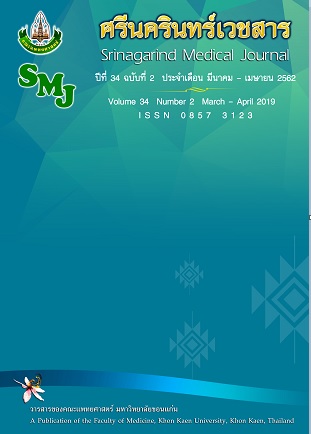Efficacy and Safety of Bevacizumab Plus Chemotherapy in Patients with Metastatic Colorectal Cancer
Keywords:
bevacizumab; efficacy; safety; metastatic colorectal cancerAbstract
Objectives: To evaluate the efficacy and safety of bevacizumab plus chemotherapy in the treatment of patients with metastatic colorectal cancer
Methods: In the single-center, retrospective observational study. We collected data from medical records and electronic databases in patients with metastatic colorectal cancer who received bevacizumab plus chemotherapy during 1 October 2010 to 31 March 2017. Outcome analyses were 1) median-overall survival (OS), progression-free survival (PFS), response rate (RR) and 2) toxicity.
Results: From a total of 37 patients. Thirty-five patients are retrieved for efficacy analysis and found that bevacizumab plus chemotherapy showed OS 18.26 months (95%CI 14.25-22.27), PFS 10.17 months (95%CI 8.23-10) and RR: partial response 54.28% and progressive disease 34.29%. All patients are retrieved for safety analysis. Hematologic toxicities were anemia 81.08%, thrombocytopenia 40.54%and neutropenia 32.43%. Non-hematologic toxicities were peripheral neuropathy 70.27%, oral mucositis 48.65% and fatigue 43.24%. Common toxicities associated with bevacizumab were proteinuria (21.62%) and 1 patient discontinued bevacizumab because she had a stroke.
Conclusions: From this study, bevacizumab plus chemotherapy showed efficacy including OS 18.26 months, PFS 10.17 months and overall response rate 54.28%. The common hematologic toxicity of bevacizumab plus chemotherapy were anemia, thrombocytopenia and neutropenia and non – hematologic toxicity were neuropathy, oral mucositis and fatigue.
References
2. National Comprehensive Cancer Network. Clinical Practice Guidelines in Oncology (NCCN Guideline) Colon Cancer version 2.2018. [Internet]. 2018 [cited Mar 20, 2018] Available from https://https://www.nccn.org/professionals/physician_gls/pdf/colon.pdf.
3. National Comprehensive Cancer Network. NCCN Clinical Practice Guidelines in Oncology (NCCN Guideline) Rectal Cancer version 1.2018. [Internet]. 2018 [cited Mar 20, 2018] Available from https:// https://www.nccn.org/professionals/physician_gls/pdf/rectal.pdf.
4. สถาบันมะเร็งแห่งชาติ กรมการแพทย์ กระทรวงสาธารณสุข. แนวทางการตรวจคัดกรอง วินิจฉัยและรักษาโรคมะเร็งลำไส้ใหญ่และไส้ตรง. กรุงเทพฯ: บริษัท โฆสิตการพิมพ์ จำกัด; 2558.
5. U.S. Food and Drug Administration. Avastin (Bevacizumab). [Internet]. (n.d.) [cited Mar 20, 2018] Available from https://www.accessdata.fda.gov/drugsatfda_docs/label/2015/125085s312lbl.pdf.
6. Zhang G, Zhou X, Lin C. Efficacy of chemotherapy plus bevacizumab as first-line therapy in patients with metastatic colorectal cancer: a meta-analysis and up-date. Int J Clin Exp Med 2015; 8: 1434-45.
7. Hurwitz HI, Tebbutt NC, Kabbinavar F, Giantonio BJ, Guan ZZ, Mitchell L, et al. Efficacy and safety of bevacizumab in metastatic colorectal cancer: pooled analysis from seven randomized controlled trials. Oncologist 2013; 18: 1004-12.
8. Macedo LT, da Costa Lima AB, Sasse AD. Addition of bevacizumab to first-line chemotherapy in advanced colorectal cancer: a systematic review and meta-analysis, with emphasis on chemotherapy subgroups. BMC Cancer 2012; 12: 89.
9. Eisenhauer EA, Therasse P, Bogaerts J, Schwartz LH, Sargent D, Ford R, et al. New response evaluation criteria in solid tumours: revised RECIST guideline (version 1.1). Eur J Cancer 2009; 45 228-47.
10. The National Cancer Institute (NCI) of the National Institutes of Health (NIH). Common Terminology Criteria for Adverse Events (CTCAE) Version 4.0. [Internet]. 2010 [cited Mar 20, 2018] Available from from https://www.hrc.govt.nz/sites/default/files/CTCAE%20manual%20-%20DMCC.pdf.
11. Bendell JC, Bekaii-Saab TS, Cohn AL, Hurwitz HI, Kozloff M, Tezcan H, et al. Treatment patterns and clinical outcomes in patients with metastatic colorectal cancer initially treated with FOLFOX–bevacizumab or FOLFIRI–bevacizumab: results from ARIES, a bevacizumab observational cohort study.Oncologist 2012; 17: 1486–95.
12. Bennouna J, Phelip JM, André T, Asselain B, Sébastien Koné, Ducreux M. Observational cohort study of patients with metastatic colorectal cancer initiating chemotherapy in combination with bevacizumab (CONCERT). Clin Colorectal Cancer 2016; 16: 129-40.
13. Fourrier-Réglat A, Smith D, Rouyer M, Bénichou J, Guimbaud R, Bécouarn Y. Survival outcomes of bevacizumab in first-line metastatic colorectal cancer in a real-life setting: results of the ETNA cohort. Target Oncol 2014; 9: 311-19.
14. Botrel TEA, Clark LGO, Paladini L, Clark OAC. Efficacy and safety of bevacizumab plus chemotherapy compared to chemotherapy alone in previously untreated advanced or metastatic colorectal cancer: a systematic review and meta-analysis. BMC Cancer 2016; 16: 677.
15. Zhu LM, Zhao YZ, Ju HX, Liu LY, Chen L, Liu BX, et al. Efficacy and safety of bevacizumab in chinese patients with metastatic colorectal cancer. Asian Pac J Cancer Prev 2014; 15 :6559-64.
16. Akun E, Okutur K, Seber S, Korkmaz T, Aydin K, Bozkurt M. Safety and tolerability of first-line bevacizumab in metastatic colorectal cancer. J BOUN 2012; 17: 669-76.




